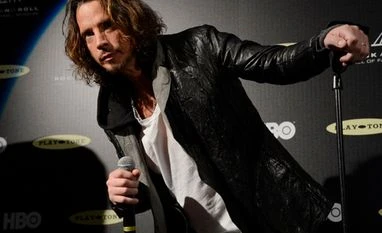Chris Cornell sang as if he were bearing the weight of the world. Whether he was fronting the ferocious hard rock of Soundgarden or backed simply by an acoustic guitar, his voice — now silenced in a suicide — was spectacular by any reckoning. It was a voice that could sail above the grunge barrage of Soundgarden, with an attack to rival the band’s churning guitars; it was also a voice that gave modest acoustic ballads an existential gravity. At the bottom of its nearly four-octave range, Cornell’s voice was a baritone with endless reserves of breath and the seething tension of contained power. He couldn’t be more convincing than when he sang one of his definitive songs, “Rusty Cage”, with Soundgarden: “I’m gonna break my rusty cage and run,” he howled.”
As it rose, higher and higher, Cornell’s voice could sustain a melody through the fray, or it could confront hard-rock turbulence with grunts, rasps, wails, bitter moans and, at the top of his range, full-bodied shrieks that admitted no weakness. Even when he was singing a long-lined melody like “Black Hole Sun”, another of his masterpieces, there was no comforting croon in his voice. It had a perpetually torn edge, a glint of tragedy.
Cornell could have used that remarkable instrument and his rock-star looks to play the standard heroic frontman: a chesty, cocky figure like two of his obvious influences, Robert Plant of Led Zeppelin and Paul Rodgers of Free. But he came from a later generation, one that had grown up on punk iconoclasm as well as metal virtuosity and that was far too self-conscious for the old rock machismo. As the main songwriter for Soundgarden — both on his own and supplying lyrics and melodies for other band members’ riffs — Cornell helped forge grunge: rock that used all its power to question rather than to exult.
Each in its own way, the leading bands of grunge — Nirvana, Pearl Jam, Soundgarden and Alice in Chains — found commercial traction with music that sabotaged older assumptions about rock. There was still plenty of aggression in the music, but it was directed inward as much as outward. Doubt could roil a song as intensely as rage. Soundgarden’s music bristled with dissonant riffs and shifting meters as Cornell belted blunt thoughts of resentment and despair: “I can’t get any lower/Still I feel I’m sinking,” he sang in “Outshined”. It wasn’t whining; it was back-to-the-wall fury.
In at least one important way, Cornell was an old-fashioned songwriter: He prized melody, and had a gift for it. The majestic ballad “Black Hole Sun”, Soundgarden’s radio breakthrough and Grammy winner, was an atypical Soundgarden song because the band never besieges the melody. But even when Cornell’s voice is sparring with guitar riffs, as in songs like “Spoonman” or “Jesus Christ Pose”, he’s not just shouting or barking; he’s tracing larger shapes.
Soundgarden at its best was Cornell’s ideal vehicle because it gave his voice copious possibilities to grapple against. After the band dissolved in 1997, he persevered, working arenas as the songwriter and frontman for former members of Rage Against the Machine in Audioslave from 2001-2007, and also making solo albums. His voice stayed strong even as it aged, and he kept up his songwriting; he even got tapped for a James Bond theme, “You Know My Name”, from “Casino Royale”.
More From This Section
But Audioslave’s music was far more conventional hard rock than Soundgarden’s had been, and on solo albums, Cornell struggled to find the right context for his voice. He even tried highly processed and programmed Top 10-style pop, produced by Timbaland, on the widely reviled album “Scream” in 2009. His best setting on his own turned out to be as a guitar-slinging singer-songwriter. That’s the core of the dramatically swelling arrangement of a song he released earlier this year, “The Promise”, an elegy that builds to lyrics that have now turned much darker: “A promise to survive/persevere and thrive/And rise once more.”
Soundgarden regrouped in 2010 and released an album of new songs, King Animal, in 2012; it had just performed on Wednesday night before Cornell died. Onstage and on albums, it seemed that the band had rekindled its old chemistry. Its final set ended with “Slaves & Bulldozers”, from its 1991 album Badmotorfinger — a heaving, bluesy, snarl building to a full scream, a song about honesty to the end. “Everything I said is what I mean,” the song insists. “Everything I gave is what I need.”
© 2017 The New York Times
)